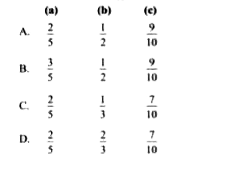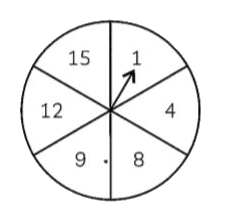Ten separate slips bearing numbers from 1 to 10 (one number on one slip), are kept in a box and mixed well. One slip is chosen from the box without looking into it. What is the probability of getting (a) a number greater than 6?
(b) a number less than 6?
(c) a 1-digit number?

The correct Answer is:A
Step by step video, text & image solution for Ten separate slips bearing numbers from 1 to 10 (one number on one slip), are kept in a box and mixed well. One slip is chosen from the box without looking into it. What is the probability of getting (a) a number greater than 6? (b) a number less than 6? (c) a 1-digit number? by Maths experts to help you in doubts & scoring excellent marks in Class 8 exams.
Updated on:21/07/2023Topper's Solved these Questions
- IMO MODEL TEST PAPER 2Book:SCIENCE OLYMPIAD FOUNDATION Chapter:IMO MODEL TEST PAPER 2Exercise:EVERYDAY MATHEMATICS
Explore 10 Videos
- IMO MODEL TEST PAPER 1Book:SCIENCE OLYMPIAD FOUNDATION Chapter:IMO MODEL TEST PAPER 1Exercise:ACHIEVERS SECTION
Explore 5 Videos
- IMO QUESTION PAPER 2017-18 SET ABook:SCIENCE OLYMPIAD FOUNDATION Chapter:IMO QUESTION PAPER 2017-18 SET AExercise:ACHIEVERS SECTION
Explore 5 Videos
Similar Questions
Number 1 to 10 are written on 10 separate slips (one number on one slip) these slips are kept in a box and mixed well. One slip is chosen from the box without looking into it. What is the probability of getting a number greater than 8.
View SolutionNumbers 1 to 10 are written on ten separate slips (one number on one slip), kept in a box and mixed well. One slip is chosen from the box without looking into it. What is the probability of .(i) getting a number 6?(ii) getting a number less than 6?(iii) getting a number greater than 6?(iv) getting a 1-digit number?
View Solution
Knowledge Check
Natural numbers 4 to 15 are written on different slips (one numbers on one slip), kept in a box and mixed well. Renu picks up one slip from the box without looking into it .What is the probability that this slip bears a prime number ?
A25B311C13D512Natural numbers 4 to 15 are written on different slips (one number on one slip), kept in a box and mixed well. Renu pick up one slip from the box without looking into it. What is the probability that this slip bears a prime number?
A13B512C25D311Natural numbers 4 to 15 are written on different slips (one number on one slip), kept in a box and mixed well. Renu picks up one slip from the box without looking into it. What is the probability that this slip bears a prime number?
A13B512C25D311

What is the probability of getting a number less than 6 on the spinner?
View SolutionNumbers 1 to 5 are written on separate slips, i.e one number on one slip and put in a box. Wahida pick a slip from the box without looking at it. What is the probability that the slip bears an odd number?
View Solution9 cards are numbered as 1,2,3,4,5,6,7,8.9. They are kept in a box and mixed thoroughly. One card is chosen at random. What is the probability of getting a prime number ?
View SolutionCards, each marked with one of the numbers 6,7,8,…,15, are placed in a box and mixed thoroughly. One card is drawn at random from the box. What is the probability of getting a card with number less than 10?
View Solution8 cards are numbered as 1,2,3,4,5,6,7,8 respectively. They are kept in a box and mixed thoroughly. One card is chosen at random. What is the probability of getting a number less than 4?
View Solution

